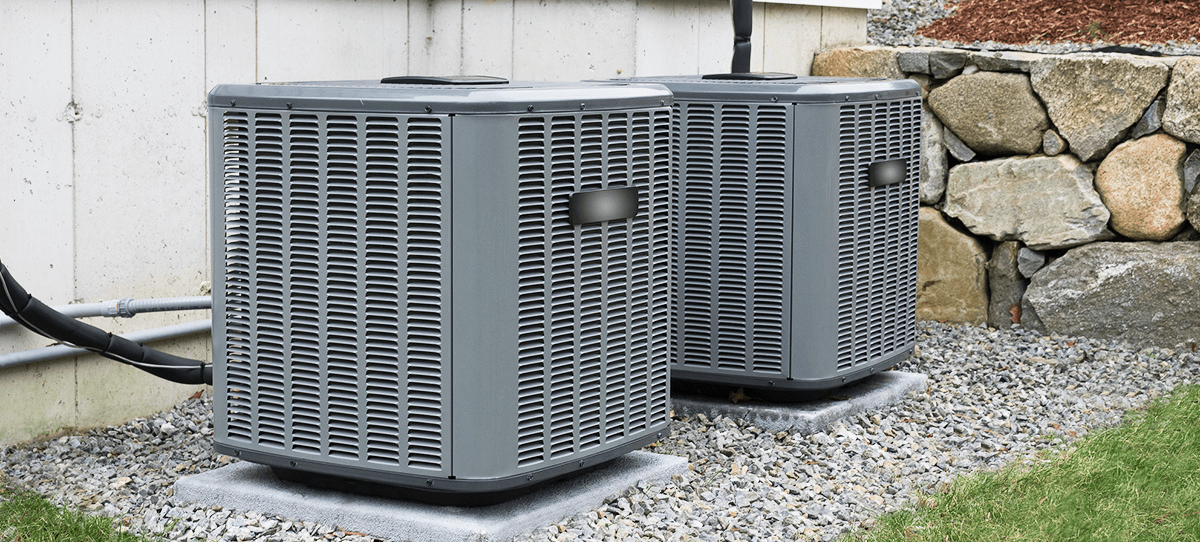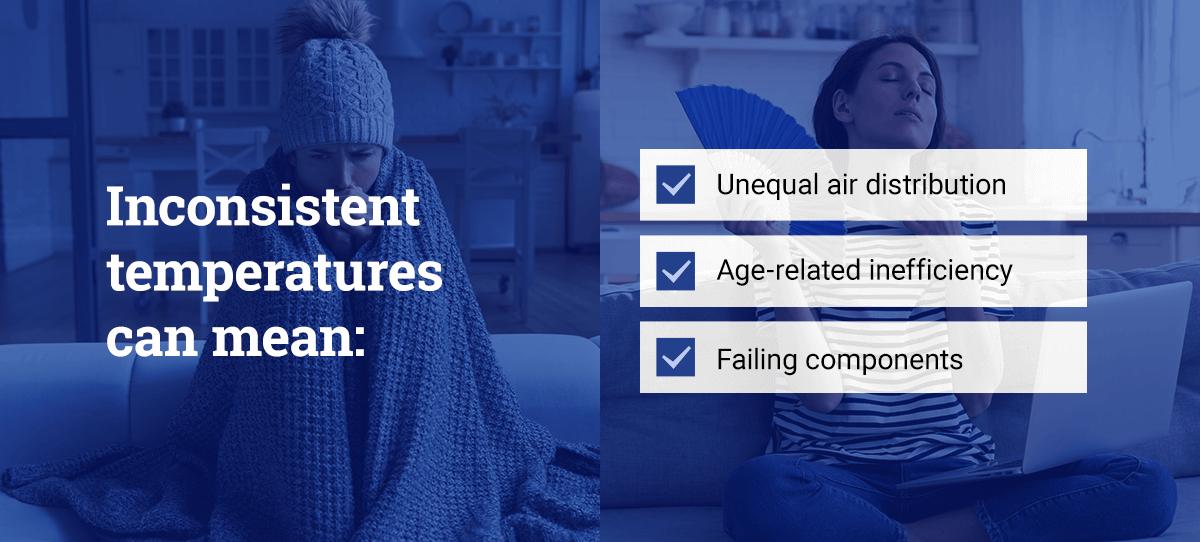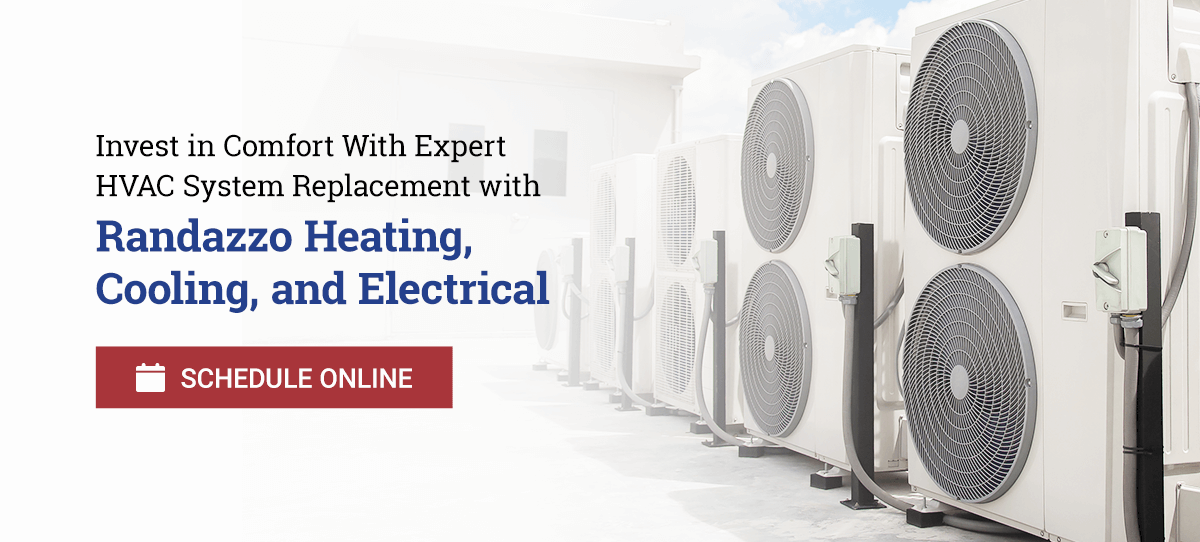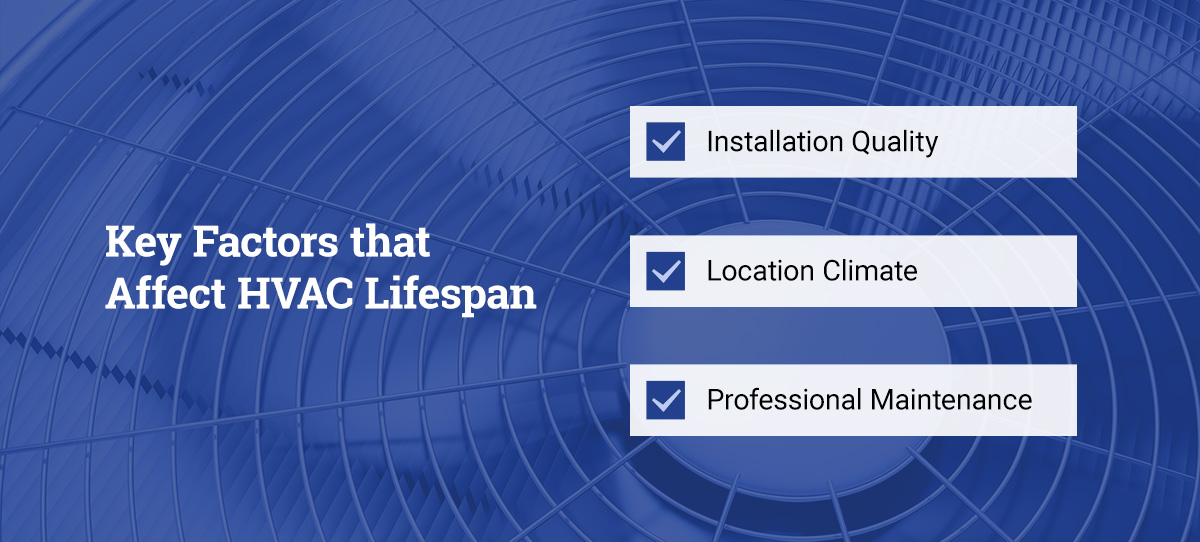
Funky smells, odd noises, barely there airflow — your HVAC gives you plenty of hints when it’s on its last legs. Ignoring the warning signs can lead to sky-high energy bills and costly repairs. Your HVAC system is your home comfort hero. It performs year-round, keeping things cool in summer and cozy in the winter. Knowing when to replace your HVAC can potentially save you money and major headaches.
Discover 10 HVAC failure indicators that it’s time to invest in a new system. From high energy bills to refrigerant spills, these signs can help you decide if your HVAC needs an upgrade.
10 Telltale HVAC System Replacement Signs
Age and frequent use take their toll on even the most well-maintained HVAC systems. Here are 10 signs that you need to replace yours:
1. Your HVAC Is Older Than 10 Years
While HVAC systems can last between 10 and 15 years, ENERGY STAR recommends replacing them after 10 years. Newer units offer reliable performance and energy efficiency. Older air conditioning units may still use phased-out refrigerants like R-22. These harmful coolants are toxic, flammable, and contribute to global warming. Modern units feature safer, more eco-friendly refrigerants.
2. Rising Energy Bills
As HVAC systems age, their components wear down. They have to work harder and use more energy to maintain the same comfort level. Leaks can also force the system to overwork, further driving up energy consumption. Keep an eye on your utility bills. A sudden noticeable increase indicates a struggling HVAC system that may be nearing the end of its lifespan.
3. Strange Noises
Are you hearing unusual sounds when your HVAC system kicks in? These noises are more than an annoyance. They point to internal mechanical problems that signal the need for replacement. Here’s how to decode HVAC moans and groans:
- Rattling and banging: Worn parts can cause noises like rattling, banging, or grinding. Failing components reduce efficiency and can cause further damage.
- Screeching or squealing: High-pitched sounds signal problems with the fan belt or motor.
- Buzzing: Loud buzzing or humming could point to a failing compressor.
- Whistling: Is your HVAC system whistling an unpleasant tune? This sound can mean leaking or blocked ducts.
If your AC repair costs more than the age of your unit times the cost of your repair, it may be time to consider a new air conditioning system.
4. Airflow Issues
Weak airflow often signals a failing blower motor, ductwork issues, or clogged coils. A dirty filter is a simple fix, but more serious problems impact efficiency and strain the system. Reduced airflow means your HVAC works harder, increasing energy bills and risking breakdowns. If the cause is a major component failure or age, replacing the system may be the most cost-effective solution.
5. Foul Odors
When you smell something strange, your HVAC could be the culprit. Musty odors may mean mold, mildew, or bacterial growth within the unit. These contaminants thrive in a damp environment and can trigger allergies or respiratory issues.
First, try changing your air filters or scheduling a maintenance visit with a reputable HVAC provider. If the odors persist, consider upgrading to a system that smells fresh and performs even better.
6. Visible Leaks
Leaks or pooling water are some of the most serious HVAC system replacement signs. Here’s why:
- Refrigerant leaks: Leaking refrigerant reduces the system’s ability to cool. It can also harm the environment. Repairing refrigerant leaks can be costly, and older systems may use harmful refrigerants.
- Condensate leaks: Persistent or large leaks can indicate a failing condensate pump or a corroded drain pan.
- Internal damage: Leaks can also stem from internal corrosion or cracks in the system’s components.
Ignoring leaks can lead to further damage. Unwelcome consequences include mold growth, structural damage, and complete system failure. Replacing the HVAC system is often the most practical and cost-effective solution.
7. Excessive Short Cycling
Is your air conditioner turning on and off more times than you can count? Short cycling means your HVAC switches off before completing a cycle. It strains your HVAC, shortening its lifespan. An oversized unit, leaks, compressor issues, or electrical faults can cause short cycling.
When short cycling persists, call in an HVAC professional. They will repair the problem if possible or recommend replacing your system.
8. Imbalanced Humidity
One of your HVAC system’s primary roles is to maintain proper humidity. Old systems lose their ability to regulate moisture. This can cause discomfort, mold growth, and damage to your home. Replacement with a modern unit can restore humidity balance and improve air quality.
9. Fluctuating Temperatures
If indoor temperatures jump between freezing cold and sweltering hot, it may be time for an HVAC replacement. Inconsistent temperatures can mean:
- Unequal air distribution: Are some rooms too hot or cold while others are comfortable? Your HVAC system is likely struggling with even air distribution. Causes range from a failing blower motor to ductwork issues.
- Age-related inefficiency: As HVAC systems age, their components wear down. Older units may struggle to maintain consistent temperatures.
- Failing components: A faulty compressor, heat exchanger, or other components can cause temperature changes.

10. Frequent Repairs
Have you become best friends with your HVAC repair technician? It might be time to retire your old system. While the occasional repair is normal, increasing issues suggest the system is nearing its end. The cost of repairs adds up over time, making replacement a more budget-savvy choice.
How Replacing Your HVAC System Makes Life More Comfortable
Upgrading to a modern HVAC system has plenty of benefits, like:
Cost Savings
A new HVAC system can translate into big savings. You could save up to 20% on heating and cooling costs by installing an ENERGY STAR-rated unit. Need more proof? According to Lennox’s energy savings calculator, upgrading from a 10 SEER to an 18 SEER air conditioning unit can save $2,160 over its lifetime.
Rebates and Tax Credits
The Inflation Reduction Act aims to address climate change and sustainability. Many states, like Michigan, offer energy rebates for upgrading to energy-efficient HVAC systems.
Improved Comfort
Replacing your old HVAC system can boost comfort in many ways, such as:
- Consistent temperatures
- Improved humidity control
- Programmable thermostats
- Better air circulation
- Smart features for added control
Enhanced Air Quality
Your HVAC system stops outdoor pollutants from getting indoors. Modern HVAC systems include high-efficiency particulate air (HEPA) filters. HEPA filters remove over 99% of dust, allergens, and other pollutants, improving indoor air quality.
Lower Operating Costs
Besides energy savings and tax rebates, installing a new HVAC unit can save money in other ways:
- Longer lifespan: With the right care, a new system can last up to 15 to 20 years. That’s two decades of heating and cooling performance before you have to worry about replacement.
- Fewer repairs: HVAC repairs come at an — often unexpected — expense. Replacing your unit is easier on your budget over the long term since they need less repair than older units.
- Reduced maintenance: Annual maintenance keeps your HVAC system healthy. Newer units require less in-depth maintenance.
Quieter Operation
Noisy HVAC systems disturb the peace of your home or office. Newer HVAC systems feature improved insulation and variable speed motors, lowering noise-causing vibrations. You enjoy quieter operation and a more peaceful environment.
Invest in Comfort With Expert HVAC System Replacement
Is your old HVAC giving you the cold shoulder? Call the pros at Randazzo Heating, Cooling, and Electrical. Our one-day HVAC installation is your ticket to enhanced comfort and energy efficiency. Experience top-notch products, outstanding workmanship, and unmatched customer service. With our flexible financing options, you can find a solution that suits your needs and budget.
Get in touch today to discover the Randazzo difference! For a free estimate or to discuss your HVAC needs, contact us online today!





